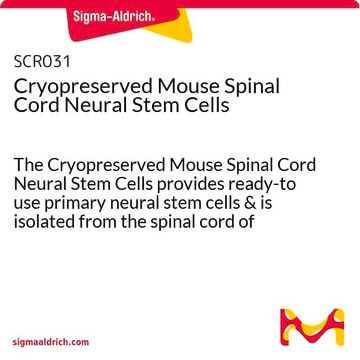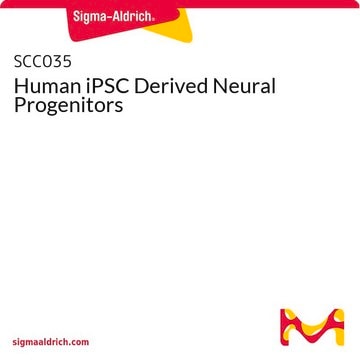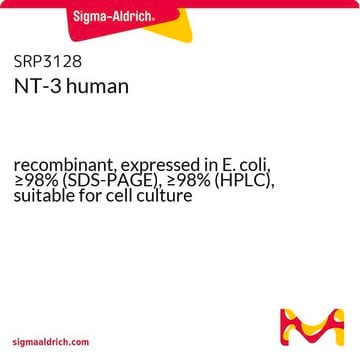SCR029
Cryopreserved Mouse Cortical Neural Stem Cells
The Cryopreserved Mouse Cortical Neural Stem Cells provides ready-to use primary neural stem cells isolated from the cortices of embryonic day 15-18 (E15-E18) C57/BL6 mice.
Sinónimos:
Cortical Stem Cells, Mouse Neural Stem Cells
About This Item
Productos recomendados
biological source
mouse
Quality Level
manufacturer/tradename
Chemicon®
technique(s)
cell culture | stem cell: suitable
input
sample type neural stem cell(s)
shipped in
liquid nitrogen
General description
We recommend that Millipore′s Cryopreserved Mouse Cortical Neural Stem Cells (Catalog No. SCR029) be used in conjunction with the Neural Stem Cell Marker Characterization Kit (Catalog No. SCR019) and differentiation assays that demonstrate multipotentiality of the starting cell population.
For Research Use Only; not for use in diagnostic procedure.
Cell Line Description
Application
Stem Cell Research
Packaging
Components
Storage and Stability
Legal Information
Disclaimer
Storage Class
12 - Non Combustible Liquids
wgk_germany
WGK 1
flash_point_f
Not applicable
flash_point_c
Not applicable
Certificados de análisis (COA)
Busque Certificados de análisis (COA) introduciendo el número de lote del producto. Los números de lote se encuentran en la etiqueta del producto después de las palabras «Lot» o «Batch»
¿Ya tiene este producto?
Encuentre la documentación para los productos que ha comprado recientemente en la Biblioteca de documentos.
Protocolos
Step-by-step culture protocols for neural stem cell culture including NSC isolation, expansion, differentiation and characterization.
Step-by-step culture protocols for neural stem cell culture including NSC isolation, expansion, differentiation and characterization.
Step-by-step culture protocols for neural stem cell culture including NSC isolation, expansion, differentiation and characterization.
Step-by-step culture protocols for neural stem cell culture including NSC isolation, expansion, differentiation and characterization.
Nuestro equipo de científicos tiene experiencia en todas las áreas de investigación: Ciencias de la vida, Ciencia de los materiales, Síntesis química, Cromatografía, Analítica y muchas otras.
Póngase en contacto con el Servicio técnico







